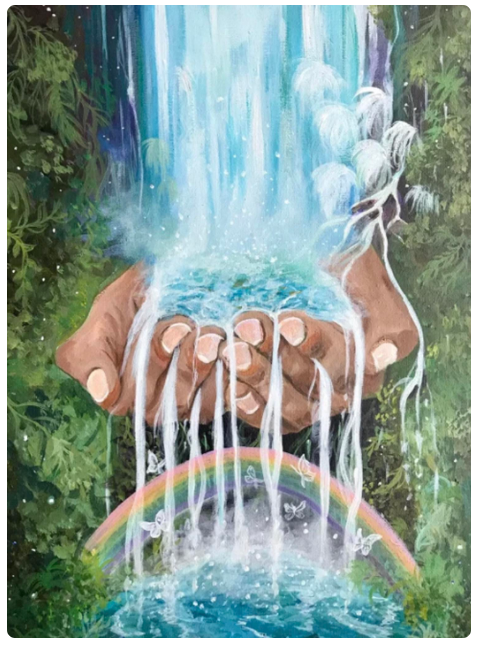Becoming a People of Forgiveness - Part 1
Photo by Alex Shute on Unsplash
Originally posted as a series on LectioLetter.com
Part 1 | Forgiving in the Power of the Spirit
“The Lord our God is merciful and forgiving, even though we have rebelled against him.” Daniel 9:9
“If You, Lord, should mark iniquities, O Lord, who could stand? But there is forgiveness with You, that You may be feared.” Psalm 130:3-4
“Father, forgive them, for they do not know what they are doing.” Luke 23:24
“Love prospers when a fault is forgiven, but dwelling on it separates close friends.”
Proverbs 17:9
Humble, gentle, kind, provocative, plain-spoken, poetic, attentive and just. These are just a few of the qualities that attract so many of us to Jesus of Nazareth, qualities that emerge from his joy-filled, difficult and contested life.
Full of the assurance that He was loved, Jesus walked through his life with confidence and gentleness in ways that can only be described as astounding. And yet, he also wept, grieved, and wrestled with loss, especially the loss of his once faithful friends. His life ended in torture with the words, "Forgive them, Father, for they do not know what they are doing.”
The life and ways of Jesus have captured and confounded generations, having become the example above all examples of what it looks like to live fully human as God intended. Yet when we reflect on our own conflicted and contested lives, we wonder how on earth Jesus lived in the way he did as this captivating expression of heaven. Often, our conclusion is that he is God, and we are not. We failingly aspire to his wonderful example but just as easily let ourselves off the hook when we consider this was the man who was fully human, yet divine. Surely Jesus’ divinity is where he receives power to be the one who navigates the complexity and pain of human existence and as the scriptures say, "was without sin?”
A curious passage in Philippians Chapter 2 tells us that the earliest Christians did not believe it was Jesus’ divinity that he drew on to live such a life. Their understanding is that he emptied himself of the privilege and power of His divine life in order to live as fully human as we are. With that being said, Jesus is not the ultimate moral champion because he does not draw on pure human resilience or resources. Taking hold of the invitation given to the first humans in the garden of Eden, Jesus receives his life from the Spirit, life which can only come from the breath of God. He makes this freshly available to us, encouraging us that a Spirit-breathed life is the only way to imitate his heavenly forgiving ways on earth.
Pouring out the Spirit in Pentecost, God restarts creation through this unlikely band of bruised servants that he calls disciples. He reminds us that to be truly and fully human, in the way God intends, requires a deep reliance on the Spirit of God. And so the fruits of the Spirit that we see so winsomely in Jesus’ life can become a reality for us as we conform our lives to the pattern of being truly human by the power of the Spirit.
Jesus doesn’t invite us to be inspired by his actions, as if he is climbing a great mountain and we are trying to limp along behind him in our own strength. Through the gift of the Spirit, Jesus becomes our helper. He is our Sherpa, directing, guiding and training us, and handing us “Holy Spirit oxygen tanks” for high altitude ascents. We cannot keep Jesus simply as a distant historical example because, by his Spirit, he is the one who is with us now, directing us on the path and pointing out the cliffs and crevasses that may signal disaster in human life. He is, as the Psalmist says, "our very present help." (Ps:46:1) He is training us to climb the mountain of holiness, a life marked by forgiveness in a surrounding world which has largely become devoid of grace.
To be honest, as we look at the ways of Jesus, there is space for a level of discouragement. This comes into sharp focus for us when we, like him, experience deep suffering, a measure of torture, or the small daily deaths of life. It is during times such as these, that we become aware of our inability, indeed often our unwillingness, to utter those unthinkably gracious words Jesus utters from the cross, "Father, forgive them, for they do not know what they are doing.”
Forgiveness lies at the centre of the Christian faith. Even before Jesus appears, God's gracious ways create avenues to live free from the burden of the sin and disorder which has infected creation. Disorder and darkness surround us, but it also creeps right inside our bones and can lead us to become, in small but also significant ways, contributors to the brokenness of God's good creation. None of us is without the brokenness we call sin, and none of us lives a life free from the need for profound forgiveness, both receiving and giving.
Like love, forgiveness seems like a great idea in theory but can feel like an impossibly difficult task in practice. We sing the songs and quote scriptures, but we often find that we are unable to forgive when impacted and affected by messy broken realities.
Calling on the power of God to have the desire and ability to forgive is central to our witness and calling. Many scriptures point to our own forgiveness in Christ and our call to do likewise, but when we are triggered and offended, a whole different set of priorities seem to flood our hearts and minds. When someone cuts me off in traffic or endangers my life through their reckless driving or impatience, I am more likely to spend the next minutes muttering or shouting insults or worse, fantasising about the violence I would enjoy expressing at their expense. My body and mind become set on revenge, and that is all I want to do. At that point, I am not thinking about forgiveness.
However, an often more crucial task of forgiveness for a follower of Jesus comes not in the slights and impoliteness of strangers, but when someone within our Christian community acts in a way that deeply hurts and offends us. One of Jesus' priorities for His people, revealed particularly in his prayer to the Father in John 17:21 is for unity;
“that they may all be one, just as you, Father, are in me, and I in you, that they also may be in us.”
Christian unity is not simply important because it's nice to be nice, but because the forgiveness we offer each other within the Christian community is one of our primary witnesses to an outside, graceless world. As Jesus himself said, “By this, all people will know that you are my disciples, if you have love for one another.” (John 13:35) If the world is to see God made visible in our age, then deep and real love for and forgiveness of one another is a key sign.
As mentioned, grace, love and forgiveness can feel like a high and holy ideal, especially when hurt, offences, misunderstandings and betrayal are experienced within our Christian communities. We feel shocked because we expect the world to be a difficult and painful place, but not here in Christian community where we hoped we would experience safety. Of course, it doesn't work like that. The brokenness that is “out there,” is in our Christian communities too. We are not perfect, and in many ways, our draw to become a Christian is perhaps our recognition of this, that we long to be healed and re-made by the grace of God. Most of us, in moments that require forgiveness to be given or received, come into contact with the reality that we have a long way to go if we are to climb this mountain.
So, how can we practice forgiveness?
I am hoping to unpack the complexity of forgiveness and some practical ways to become people of forgiveness in the following parts of this series. We need to take an honest look at our ideals, theories, scriptures and songs about forgiveness, and get real for a moment. There is work to do so that we move towards being ready to offer and receive the gift of forgiveness. In times when we are not feeling provoked or triggered by situations requiring forgiveness, we need to become clear-eyed and full-hearted in our preparation to become the type of people who can have a forgiving countenance.
About the author: Liam and Rachel Byrnes joined All Nations and did their CPx (Church Planting Experience) in 2010 in Cape Town. They've lived there ever since working in the township of Masiphumelele encouraging and mentoring young people and local leaders. In the past few years, alongside a local team, they've helped lead Isithembiso, the Child of Promise ministry. They also serve the YWAM University of the Nations' Centre for Christian Formation and Discipleship, teaching, training, mentoring, and coaching other mission and ministry leaders.
Get Connected & Let’s Grow Together!
We invite you! Here are some amazing resources and events we hope you’ll check out!
To participate or learn about our monthly global prayer for the neglected people around the world, sign-up HERE to receive a monthly video prayer invite. We meet on the last Thursday of each month at 8 am CST (US). We encourage everyone to join in as we pray that Jesus will be worshiped by all peoples of the earth — the least, the last, and the lost!
Lessons from the Least, the Last, and the Lost, All Nations Weekly Devotion by Blake Staton, M.Div.
All Nations Pocket Guide to Church Planting by Dr. Pam Arlund (in many languages)
All Nations Storytelling Resource
Mission’s Edge, a monthly roundtable learning opportunities with ministry and missions leaders! Sign-up for any of these today and participate! Let’s grow together!
Our Founder, Floyd McClung, has 18 books and audio/video teachings that will be an encouragement to you as you press in to all Jesus has for you in your journey! Connect HERE to our founders area to be equipped!
What are you needing? Reply and let us know how we can help you! You can also email us at: comm@allnations.international.
We want to serve you and help you find your seat in the Great Commission. We have volunteer opportunities, too!
Be sure to see some of our recent blogs below to continue learning and growing with us!
Bless you today!











